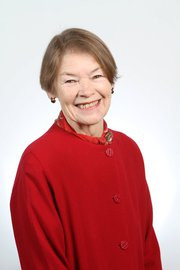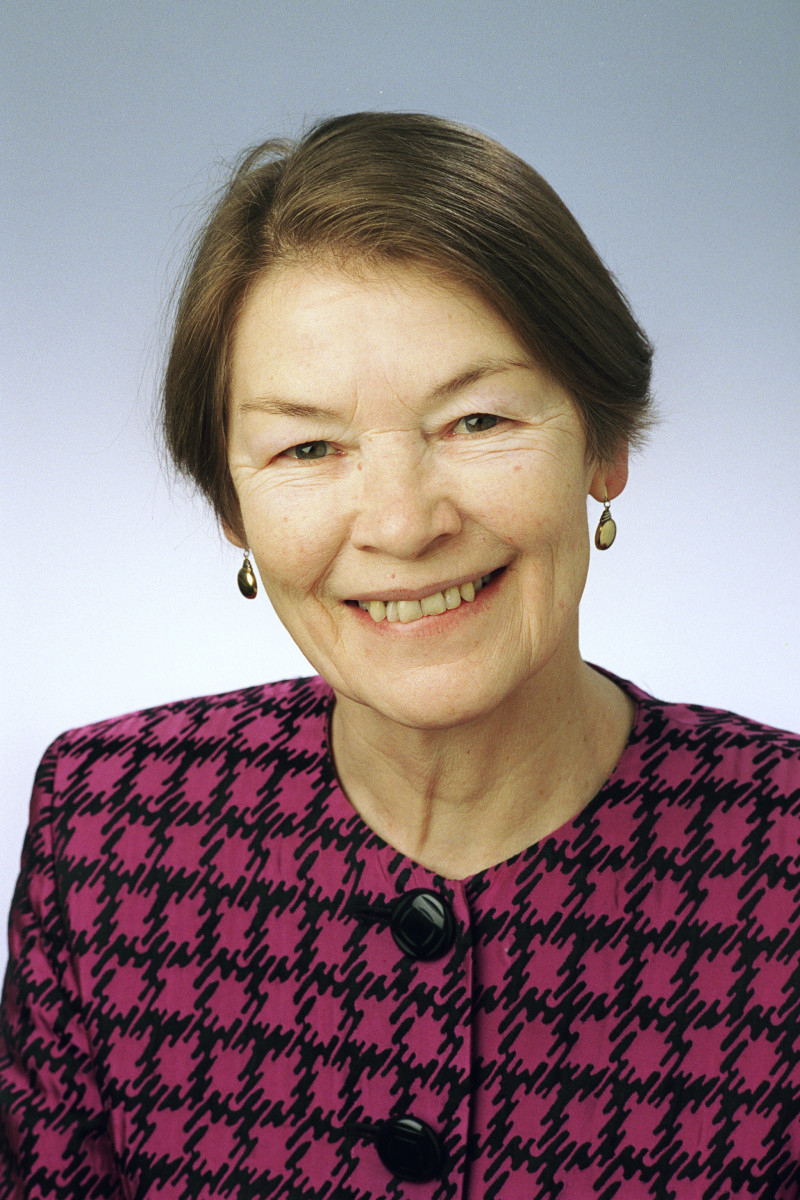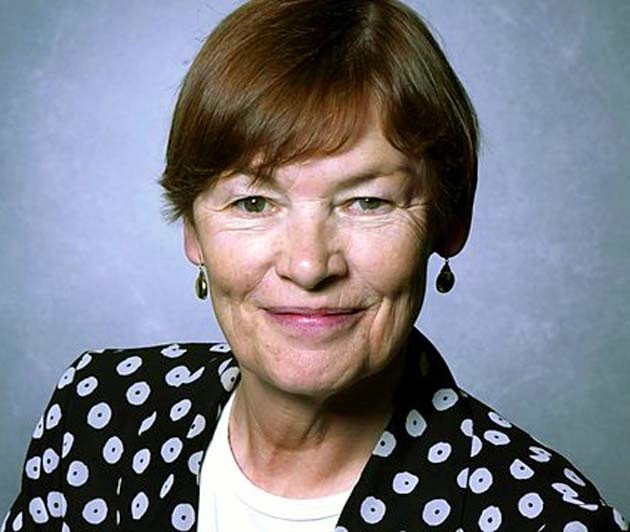Glenda May Jackson CBE (9 May 1936 – 15 June 2023) was an English actress and politician. She was one of the few artists to achieve the Triple Crown of Acting, having won two Academy Awards, three Emmy Awards and a Tony Award. She was made a CBE by Queen Elizabeth II in 1978.
She won the Academy Award for Best Actress twice: for her roles in Women in Love (1970) and A Touch of Class (1973). She won the BAFTA Award for Best Actress in a Leading Role for Sunday Bloody Sunday (1971). Her other notable roles include Mary, Queen of Scots (1971), Hedda (1975), The Incredible Sarah (1976), and Hopscotch (1980). She won two Primetime Emmy Awards for her role as Elizabeth I in the BBC series Elizabeth R (1971). She received the British Academy Television Award for Best Actress for her role in Elizabeth Is Missing (2019).
Jackson studied at the Royal Academy of Dramatic Art (RADA). She made her Broadway debut in Marat/Sade (1966). She received five Laurence Olivier Award nominations for her West End roles in Stevie (1977), Antony and Cleopatra (1979), Rose (1980), Strange Interlude (1984), and King Lear (2016), the latter being her first role after a 25-year absence from acting, which she reprised on Broadway in 2019. She won the Tony Award for Best Actress in a Play for her role in the revival of Edward Albee's Three Tall Women (2018).
Jackson took a hiatus from acting to take on a career in politics from 1992 to 2015 and was elected as the Labour Party MP for Hampstead and Highgate in the 1992 general election. She served as a junior transport minister from 1997 to 1999 during the government of Tony Blair, later becoming critical of Blair. After constituency boundary changes, she represented Hampstead and Kilburn in 2010. At the 2010 general election, her majority of 42 votes, confirmed after a recount, was the narrowest of that parliament. Jackson stood down at the 2015 general election and returned to acting.
Early life
Glenda Jackson was born at 151 Market Street in Birkenhead, Cheshire, on 9 May 1936. Her mother named her after the Hollywood film star Glenda Farrell. Shortly after her birth, the family moved to Hoylake, on the Wirral. Glenda's family was very poor and lived in a two-up, two-down house with an outside toilet at 21 Lake Place. Her father Harry was a builder, while her mother Joan (née Pearce) worked at the local supermarket checkout, pulled pints in a pub, and was a domestic cleaner.
The oldest of four daughters, Glenda was educated at Holy Trinity Church of England and Cathcart Street primary schools, followed by West Kirby County Grammar School for Girls in nearby West Kirby, and performed in the Townswomen's Guild drama group during her teens. Jackson made her first acting appearance in J. B. Priestley's Mystery of Greenfingers in 1952 for the YMCA Players in Hoylake. She worked for two years in Boots the Chemists, before winning a scholarship in 1954 to study at the Royal Academy of Dramatic Art (RADA) in London. Jackson moved to the capital to begin the course in early 1955.
Acting career
1957–1968: Early career
In January 1957, Jackson made her professional stage debut in Ted Willis's Doctor in the House at the Connaught Theatre in Worthing. This was followed by Terence Rattigan's Separate Tables, while Jackson was still at RADA, and she began appearing in repertory theatre. She was also a stage manager at Crewe in repertory theatre.
From 1958 to 1961, Jackson went through a period of two and a half years in which she was unable to find acting work. She unsuccessfully auditioned for the Royal Shakespeare Company (RSC), and undertook what she later described as "a series of soul-destroying jobs".
This included waitressing at The 2i's Coffee Bar, clerical work for a large City of London firm, answering phones for a theatrical agent, and a role at British Home Stores. She also worked as a Bluecoat at Butlin's Pwllheli holiday resort on the Llŷn Peninsula in North West Wales, where her new husband and fellow actor Roy Hodges was a Redcoat. Jackson eventually returned to the repertory theatre in Dundee but worked in bars in between acting jobs.
Jackson made her film debut in a bit part in the kitchen sink drama This Sporting Life (1963). A member of the RSC for four years from 1963, she originally joined for director Peter Brook's Theatre of Cruelty season, which included Peter Weiss' Marat/Sade (1965), where she played an inmate of an insane asylum portraying Charlotte Corday, the assassin of Jean-Paul Marat. The production ran on Broadway in 1965 and in Paris[15] (Jackson also appeared in the 1967 film version). She appeared as Ophelia in Peter Hall's production of Hamlet the same year. Critic Penelope Gilliatt thought Jackson was the only Ophelia she had seen who was ready to play the Prince himself.
The RSC's staging at the Aldwych Theatre of US (1966), a protest play against the Vietnam War, also featured Jackson, and she appeared in its film version, Tell Me Lies. Later that year, she starred in the psychological drama Negatives (1968), which was not a huge financial success but won her more good reviews.
1969–1980: Film and television
Jackson's starring role in Ken Russell's film adaptation of D. H. Lawrence's Women in Love (1969) led to her first Academy Award for Best Actress. Brian McFarlane, the main author of The Encyclopedia of British Film, wrote: "Her blazing intelligence, sexual challenge, and abrasiveness were at the service of a superbly written role in a film with a passion rare in the annals of British cinema."
In the process of gaining funding for The Music Lovers (1970) from United Artists, Russell explained it as "the story of a homosexual who marries a nymphomaniac," the couple being the composer Pyotr Ilyich Tchaikovsky (Richard Chamberlain) and Antonina Miliukova, played by Jackson. The film received mixed reviews in the U.S.; the anonymous reviewer in Variety wrote of the two principals, "Their performances are more dramatically bombastic than sympathetic, or sometimes even believable." The Music Lovers was a box-office success in Europe, reaching No. 1 in the UK's weekly rankings in March 1971. It was the first of four films starring Jackson which topped the box-office charts in the UK. Jackson was initially interested in the role of Sister Jeanne in The Devils (1971), Russell's next film, but turned it down after script rewrites and deciding that she did not wish to play a third neurotic character in a row.
Jackson had her head shaved to play Queen Elizabeth I in the BBC's serial Elizabeth R (1971). After the series aired on PBS in the US, she received two Primetime Emmy Awards for her performance. She also played Queen Elizabeth in the film Mary, Queen of Scots; and gained an Academy Award nomination as well as a BAFTA Award for her role in John Schlesinger's Sunday Bloody Sunday (both 1971). In July, Sunday Bloody Sunday topped the UK box-office charts for two weeks. That year, British exhibitors voted her the 6th most popular star at the British box office. Jackson's popularity was such that 1971 saw her receive Best Film Actress awards from the Variety Club of Great Britain (who also rewarded her similarly in 1975 and 1978), the New York Film Critics and the US National Society of Film Critics.
Mary, Queen of Scots was premièred in December 1971 in Los Angeles and was the 1972 Royal Film Performance in Britain, attended by the Queen Mother, Princess Margaret, and Lord Snowdon. The film reached No. 1 in the UK box-office charts in April of that year, a position it held for five consecutive weeks. Jackson made the first of several appearances with Morecambe and Wise in their 1971 Christmas special. Appearing in a comedy sketch as Cleopatra for the BBC Morecambe and Wise Show, she delivered the line, "All men are fools and what makes them so is having beauty like what I have got." Her later appearances included a song-and-dance routine (where she was pushed offstage by Eric), a period drama about Queen Victoria, and another musical routine (in their Thames Television series) where she was elevated ten feet in the air by a misbehaving swivel chair. Jackson and Wise also appeared in a 1981 information film for the Blood Transfusion Service.
Filmmaker Melvin Frank saw Jackson's comedy skills on the Morecambe and Wise Show and offered her the lead female role in his romantic comedy A Touch of Class (1973), co-starring George Segal, which was a UK box-office No. 1 in June 1973. In February 1974, Jackson's role in the film won her the Academy Award for Best Actress. She continued to work in the theatre, returning to the RSC for the lead in Ibsen's Hedda Gabler. A later film version directed by Trevor Nunn was released as Hedda (1975), for which Jackson was nominated for an Oscar. In The New York Times, Vincent Canby wrote: "This version of Hedda Gabler is all Miss Jackson's Hedda and, I must say, great fun to watch ... Miss Jackson's technical virtuosity is particularly suited to a character like Hedda.
Her command of her voice and her body, as well as the Jackson mannerisms, have the effect of separating the actress from the character in a very curious way."
In 1978, she scored box office success in the United States in the romantic comedy House Calls, co-starring Walter Matthau, with the film spending two weeks at No. 1 in the US box-office rankings. House Calls was the biggest box-office hit of her career in the US. That year, she was awarded a CBE. In 1979, she reunited with her A Touch of Class colleagues Segal and Frank for the romantic comedy Lost and Found. Jackson and Matthau teamed again in the comedy Hopscotch (1980), which debuted at No. 1 in its opening weekend at the US box office, also spending its second week in the top spot.
For her 1980 appearance on The Muppet Show, Jackson told the producers she would perform any material they liked. In her appearance, she has a delusion that she is a pirate captain who takes over the Muppet Theatre as
her ship.
1980–1992: Later acting career
Fifteen years after the New York engagement of Marat/Sade, Jackson returned to Broadway in Andrew Davies's Rose (1981) opposite Jessica Tandy; both actresses received Tony nominations for their roles.
In September 1983, The Glenda Jackson Theatre in Birkenhead was named in her honor.
The theatre was attached to Wirral Metropolitan College but demolished in 2005 following the establishment of a purpose-built site for students.
In 1985, she appeared as Nina Leeds in a revival of Eugene O'Neill's Strange Interlude at the Nederlander Theatre in a production that had originated in London the previous year and ran for eight weeks. John Beaufort for The Christian Science Monitor wrote: "Bravura is the inevitable word for Miss Jackson's display of feminine wiles and brilliant technique." Frank Rich in The New York Times thought Jackson, "with her helmet of hair and gashed features," when Leeds is a young woman, "looks like a cubist portrait of Louise Brooks," and later when the character has aged several decades, is "mesmerizing as a Zelda Fitzgeraldesque neurotic, a rotting and spiteful middle-aged matron and, finally, a spent, sphinx-like widow happily embracing extinction." Herbert Wise directed a British television version of O'Neill's drama which was first broadcast in the US as part of PBS's American Playhouse in January 1988.
In November 1984, Jackson appeared in the title role of Robert David MacDonald's English translation of Racine's Phèdre, titled Phedra, at The Old Vic. The play was designed and directed by Philip Prowse, and Robert Eddison played Theramenes. The Daily Telegraph's John Barber wrote of her performance, "Wonderfully impressive... The actress finds a voice as jagged and hoarse as her torment". Benedict Nightingale in The New Statesman was intrigued that Jackson didn't go in for nobility, but played Racine's feverish queen as if to say that "being skewered in the guts by Cupid is an ugly, bitter, humiliating business". The costume which Prowse designed for Jackson's performance is in the Victoria and Albert Museum, and iconic photographs of Jackson in the role can be found online.
In 1989, Jackson appeared in Ken Russell's The Rainbow, playing Anna Brangwen, mother of Gudrun, the part for which she had won her first Academy Award twenty years earlier. The same year, she played Martha in a Los Angeles production of Edward Albee's Who's Afraid of Virginia Woolf? at the Doolittle Theatre (now the Ricardo Montalbán Theatre). Directed by the playwright himself, this staging featured John Lithgow as George. Dan Sullivan in the Los Angeles Times wrote that Jackson and Lithgow performed "with the assurance of dedicated character assassins, not your hire-and-salary types" with the actors being able to display their character's capacity for antipathy. Albee was disappointed with this production, pointing to Jackson, who he thought "had retreated back to the thing she can do very well, that ice-cold performance. I don't know whether she got scared, but in rehearsal, she was being Martha, and the closer we got to opening the less Martha she was!"
She performed the lead role in Howard Barker's Scenes from an Execution as Galactia, a sixteenth-century female Venetian artist, at the Almeida Theatre in 1990. It was an adaptation of Barker's 1984 radio play in which Jackson had played the same role.
2015–2023: Return to acting
In 2015, Jackson returned to acting following a 23-year absence, having retired from politics. She took the role of Dide, the ancient matriarch, in a series of Radio 4 plays, Blood, Sex, and Money, based on a series of novels by Émile Zola.[61] She returned to the stage at the end of 2016, playing the title role in William Shakespeare's King Lear at the Old Vic Theatre in London, in a production running from 25 October to 3 December. Jackson was nominated for Best Actress at the Olivier Awards for her role but ultimately lost out to Billie Piper. She did, however, win the Natasha Richardson Award for Best Actress at the 2017 Evening Standard Theatre Awards for her performance. Dominic Cavendish of The Telegraph wrote, "Glenda Jackson is tremendous as King Lear. No ifs, no buts. In returning to the stage at the age of 80, 25 years after her last performance (as the Clytemnestra-like Christine in Eugene O'Neill's Mourning Becomes Electra at the Glasgow Citizens), she has pulled off one of those 11th-hour feats of human endeavor that will surely be talked about for years to come by those who see it."
In 2018, Jackson returned to Broadway in a revival of Edward Albee's Three Tall Women, winning the 2018 Tony Award for Best Actress in a Play. Marilyn Stasio of Variety wrote, "Watching Glenda Jackson in theatrical flight is like looking straight into the sun. Her expressive face registers her thoughts while guarding her feelings. But it's the voice that really thrills. Deeply pitched and clarion clear, it's the commanding voice of stern authority. Don't mess with this household god or she'll turn you to stone."
Jackson returned to the role of King Lear on Broadway in a production that opened in April 2019.[65] Director Sam Gold describes her portrayal of Lear in The New York Times Magazine: "She is going to go through something most people don't go through. You're all invited. Glenda Jackson is going to endure this, and you're going to witness it."
In 2019, after a 27-year absence, Jackson returned to television drama, portraying an elderly grandmother struggling with dementia in Elizabeth Is Missing on BBC One, based on the novel of the same name by Emma Healey, for which she won the BAFTA TV Award for Best Actress and International Emmy Award for Best Actress.
It was reported in February 2021 that Jackson would co-star with Michael Caine in The Great Escaper, a film telling the true story of Bernard Jordan's escape from his care home to commemorate the 70th anniversary of the D-Day landings in France. Caine will play Jordan, with Jackson as his wife Irene. Caine and Jackson previously starred together in The Romantic Englishwoman (1976). Jackson had completed filming on The Great Escaper before her death in June 2023.
In July 2022, the British Film Institute celebrated her film and television career with a month-long retrospective season at the BFI Southbank in London. As well as screenings of her work, the program included Glenda Jackson in Conversation, in which she was interviewed about her career live on stage by broadcaster John Wilson.

 Amanda S. Stevenson
Amanda S. Stevenson 
 Amanda S. Stevenson
Amanda S. Stevenson 
 Amanda S. Stevenson
Amanda S. Stevenson 